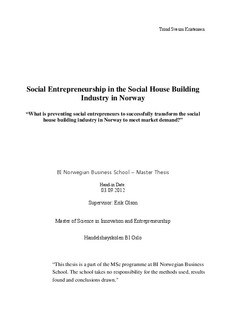Social entrepreneurship in the social house building industry in Norway : what is preventing social entrepreneurs to successfully transform the social house building industry in Norway to meet market demand?
Master thesis
Permanent lenke
http://hdl.handle.net/11250/95022Utgivelsesdato
2013-02-13Metadata
Vis full innførselSamlinger
- Master of Science [1621]
Sammendrag
The purpose of this thesis is to assess the Norwegian social house building industry, and identify potential barriers that limit entrepreneurship within the industry. Failure to meet increasing demand of social houses has resulted in continuous criticism of the industry for not reacting to the market. The research conducted suggests that there are several reasons as to why the industry has failed to meet market demand. From a theoretical perspective, the stakeholders’ inability to understand their respective roles has instituted a situation in which all are making demands, yet unwilling to undertake any responsibility. The theoretical framework is further criticized for being too rigid in its definition of who a social entrepreneur is, and challenged with the author’s understanding of the individual municipal as a social entrepreneur. It is further emphasized that a social entrepreneur is unable to change society without the benefits of social networks. A discussion about social entrepreneurship is therefore greatly limited if not complimented with social networks. In the social house building industry there is a need of allocating responsibility to the individual municipal, empowering these municipals through government regulations, and establishing social houses as an opportunity to relief social suffering. Current practice encumber private social entrepreneurs to participate in the initiating of social house building, and is ultimately having the opposite effect of its intention. Private providers of welfare have been limited in Norway due to fear of potential commercialization that will have a negative impact on price and services. It therefore is paradoxical that the government’s inability to match supply and demand has had this effect fundamentally associated with private actors.
Beskrivelse
Masteroppgave (MSc) in Master of Science in Innovation and Entrepreneurship, Handelshøyskolen BI, 2013
